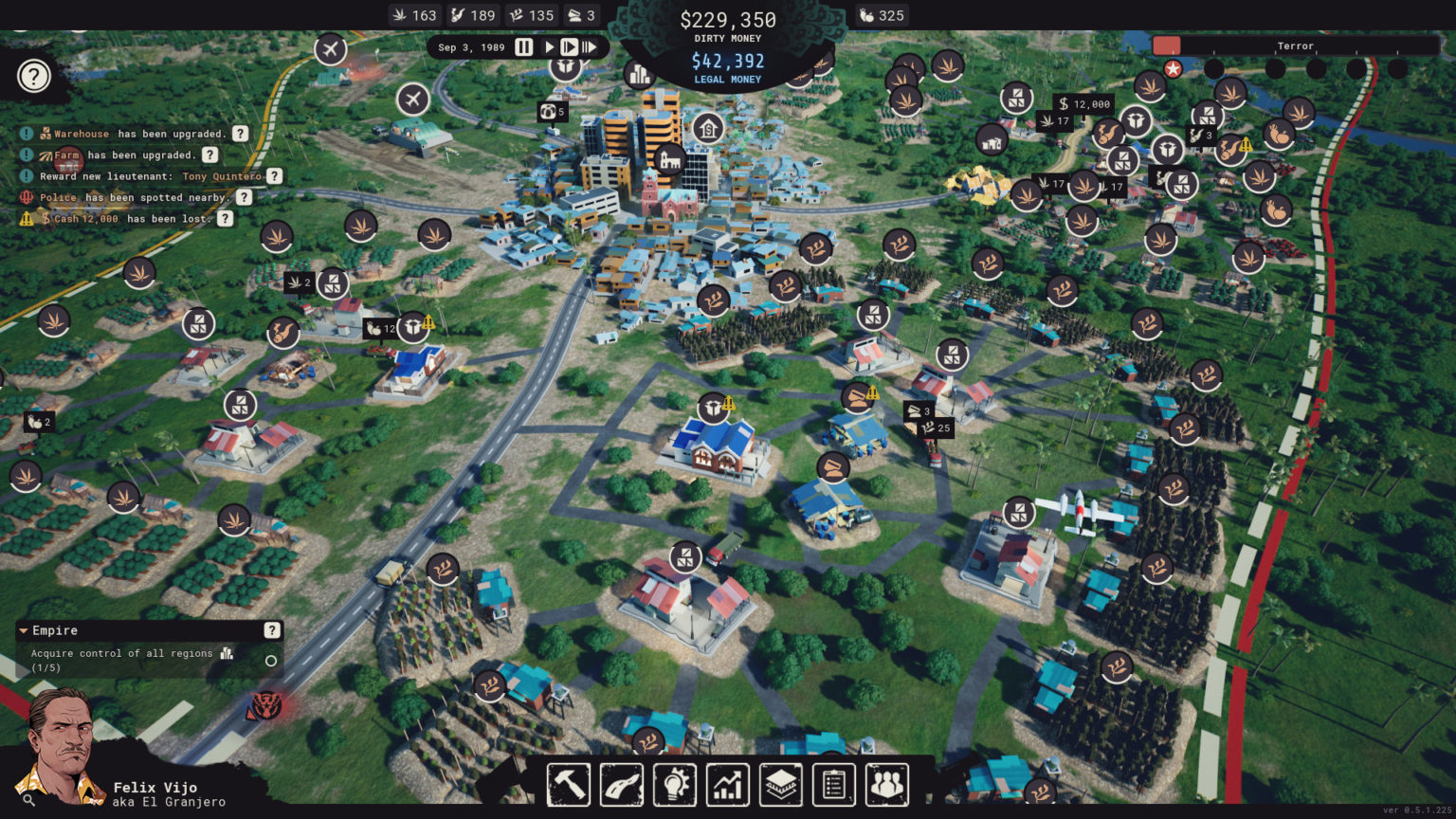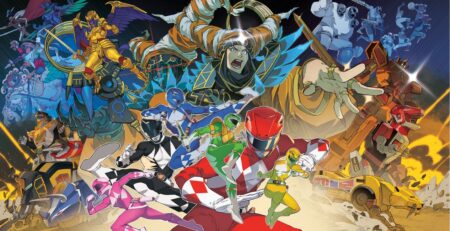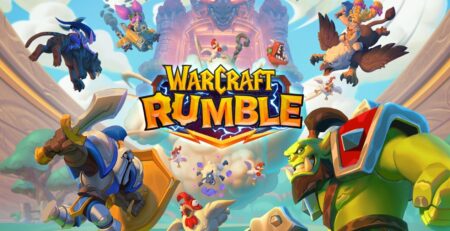
During PAX Online, games publisher TinyBuild announced a new simulator: Cartel Tycoon. Developed by St. Petersburg based RTS veterans, Moon Mouse, this sim puts players in the role of drug tycoons via a story-driven strategy game inspired by the ‘80s narco trade. As a succession of fictional drug lords, run all aspects of the empire. Smuggle products over the border, launder dirty money, and earn the loyalty of the common people while fending off rival cartels and evading the eye of the law.
Cartel Tycoon has its players manage huge logistical systems in pursuit of profit. Establish farms, maintain housing, and build production lines and workshops. Optimize the trade of cannabis and cocaine, then research new drugs and ways to hide and transport them. But, the thing about war? It’s bad for business. As profits climb, a vicious cycle of violence begins, ultimately spelling the kingpin’s doom. But failure is part of the experience—take over the empire as one of your lieutenants to continue the succession, pick up the pieces, and start rebuilding. Survive as long as possible, facing roguelike challenges and conditions with each new leader. While we had our reservations about the game’s subject matter, we wanted to talk to the devs behind it as well.
During PAX Online, we got the chance to speak with Anton Pavlov of tinyBuild and the game’s creator Leonid Gorbachev, from Moon Mouse. During our interview, site co-founders, Kate Sanchez and Matt Donahue got the chance to ask them about the inspiration for the game, how the game deals with stereotypes, and how it tries to keep from glorifying narco culture – through a procedural drama storyline that always makes the drug or lose.
BUT WHY THO: What was the inspiration behind Cartel Tycoon?
LEONID GORBACHEV: There are a lot of things which gave me this idea but through the very beginning it was Breaking Bad. I thought for a while about how I could make a game that feels like that, where you’re a hero and you go deeper and deeper into bad things. So, It was hard to make the game just like Breaking Bad and one of my friends told me that cartels is a much more interesting theme. I began to research and decided, “yes, we can do it.” Because I watch the Narcos TV series which was very cool and nice – it was our main reference for awhile. And also the book Narconomics, which is a book about modern Narco culture and vartels. But I was also inspired by Ghost Recon: Wildlands. I think about our game like the Wildlands but you’re a cartel couple, and you’re just trying to survive while the DEA and CIA guys try to destroy your empire. So this was our plot and then we tried to build the best Tycoon game. And the theme gives us an understanding that it should be about survival because narcos should survive.
BUT WHY THO: As a follow up question to that, you know cartels and narco culture – especialy here in the United States – have been used to push negative stereotypes about Latinx communities, so, how had tinyBuild been able to handle the subject respectfully in Cartel Tycoon?
ANTON PAVLOV: First, we are not talking about any real events or any real person. Our game is actually set in the 1980s which was a time when cocaine became huge and the number one drug in the world. This is also when the cartels in Latin America made their profits. We are not trying to be provocative for the sake of provocation here. We are just trying to come up with a game that makes it matter from the gameplay perspective. You are a fictional drug lord in a fictional country and you are dealing with the same things that people were dealing with in the 1980s. So to your question, we’re not trying to be controversial, we’re just trying to honestly simulate. We are also not trying to switch it up, because one of our cornerstones of the game is that you will die a lot like a roguelike.
GORBACHEV: We try to be a criminal drama in this way and it follows the rules of a criminal drama. It’s why the heroes [the player] will always be dead in the end.
BUT WHY THO: Since simulators are about adapting things into a player management style, what research did you all put into designing the core elements and management systems of the game? Or even things like police interaction, city upgrades, and everything else.
GORBACHEV: Wow, this is an interesting question. We didn’t want to create an instruction on HOW to be a narco. We wanted to make it realistic to make it look like a simulation but only in appearance. So, we just researched the book Narconomics and took some pieces like that. We also looked to the game Rise of Industry because narcos just try to move good from one border to another, so you think about logistics a lot. The core gameplay is puzzles with logistics. That’s how we run it. You are a smuggler and you just try to be the best smuggler some how.
And yes, when we thought about attacks from enforcement we were inspired by Pulp Fiction and how it looks like and what the player will feel. We think about good looking methods that look like an arrest or attack from one side. On the other side, let’s take a look, in Latin America enforcers attack like cartels like that because, uh with the “booms” becuase it looks nice on TV and they attempt to get more attention from the government like that. From one side it’s from the community and the other side it’s like fiction. And in this way we try to do the best.

BUT WHY THO: Going from that, I want to ask about the Lieutenant System and what went into the decision to have Lueitenents with all their unique features? This is different than most simulators because it’s not just one character that you control and move around your cartel.
GORBACHEV: We think about narrative, so if it game is called cartel, it should be some person inside. So we just can’t say no to this system. We thought about it for awhile and in Tycoon games you can’t just do some things. So we wanted it to be like some helpers. They just give you some help and if you lose them somehow then you feel bad about that and you will try to keep them with you…Even if you lose them it’s bad but sometimes, like in cartels, you start to hate some guys for some reason. So now we tried to create a system where Lieutenants betrayed you some how…and you think “What would happen should I kill that guy?”
So the narrative just gives you the idea and we can’t say no to that idea.
BUT WHY THO: So, dividing the map up. Why did you do that, with different controlled areas? And is there going to be some sort of multi-player since there is more than one cartel you are playing against.
GORBACHEV: We’ve thought about this idea and we think in the distant future it could be. But for now we’re focused on single-player and the player should feel like they’re in the very beginning of the cartel era when there was a lot of law against narcos and drugs and the market was on the rise. This is where the beginning is so you are the only cartel and all the other guys are just against. So you feel like you ar big and the government is against you. So, the next is to create the game or DLC about cartel wars, maybe single game, or multiplayer game – we think about it for now.
We have experience in multiplayer from our previous project so we designed those features like, oh, these are multiplayer features. So, it should work, but we just focused on the single for now.
BUT WHY THO: What is one feature that you’re excited for people to see that wasn’t in the demo?
GORBACHEV: We create some new features about conquesting the cities. In the demo it’s a very rude feature, and I don’t like it in this way. But we reproduce feature and do it in another way. So you should complete some quest with the mayor of the city and you start to be a friend with him and he starts to become a part of your cartel. That’s how you get the city in a region. So to move to another region you should complete a chain of quests and all of those quests are connected through a chain of story. So every city and every mayor should give you a story. This feature is very exciting and I hope that players will feel good about it.
And an other one is the mayor himself. Yes, he is the Lieutenant himself, but he gets an ability like “favor” and you get to ask him for a favor like “prevent attacks from federal” and this gives you an opportunity to raise your empire. In the demo it was a scripted event but in the final game it will be regular mechanics.
BUT WHY THO: What are some features unique to Cartel Tycoon that people may not be expecting from a management or simulator game?
GORBACHEV: Mostly survival mechanics. You can be and your empire can be ruined. Most simulators and Tycoons gives you a feeling that everything is just fine and everything will be okay. Like [Two Point Hospital] or [Anno 1800] are relaxing games. This is more like Frostpunk with a darkside of Tycoons, the dark side fo simulators and in this way it’s a very different game.
BUT WHY THO: Is there anything else you would like to add?
GORBACHEV: We would just like to say that yes from one side its a criminal drama fiction and from the other side the game has some message to people that the modern war with drugs gives us nothing, like from the book from Narconomics. So, there are a lot of things to think about.
BUT WHY THO: So, how did you adapt some of the pieces of Narconomics into Cartel Tycoon? I understand how things like Narcos, the TV show influenced this, but can you go into more detail about how the book influenced this?
GORBACHEV: First of all, its a feeling that this is a business. So you see it like an investment and you invest in your future and you get – and the difference is that it’s super profitable. And the point is that your investments is very profitable so you get plus 100% to your investments. And we revised this in the game. Just think that every player will think: “yeah, I put $20,000 in there and I got two million from that. WOW!” And this is how narcos feel for the first time. From the economics books and the TV shows and series this is it.
And another thing is attacks by enforcers. I was inspired by that. And another thing is maybe recipes because in the book he describes how they do it and why this is profitable. And the last thing about farmes, the villagers, and sometimes narcos buy raw materials from locals and at very low price…so all those things.
PAVLOV: I don’t know how Leonid feels about it, but I like saying that Cartel Tycoon is a cautionary tale for kids to not become drug lords. This is really what it is. It looks like a good career but it’s not so we made a game about it.
Cartel Tycoon is currently set to release in Q4 of 2020.





